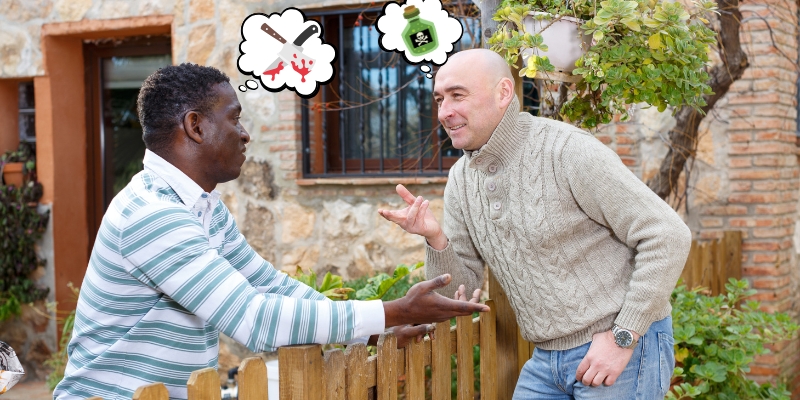When I was a child, my mother told me we were commanded to love our neighbors. I nodded, partly because I respected her authority, and partly because she controlled bedtime and access to the cookie jar. By middle school, I realized she wouldn’t have handed down that command if she’d actually met all our neighbors.
Some of the local residents were OK. A couple you might even call lovable based on the amount of candy they handed out on Halloween. Then there were the adults and even some my age that gave off authentic scary movie vibes—the kids who would only do book reports on Stephen King novels.
Of course, back then I did not suspect any of our neighbors would want me dead. Since then, I’m not so sure. It might explain why our backyard baseball games always ended with someone bleeding. The biggest kid on our street always grabbed the pitcher’s mound and then threw the ball like our heads were in the strike zone. He got away with it then. Today he’d be voted “most likely to feature on a true crime podcast.”
Now, after years of careful observation, I can say that while I don’t know you, I do know something about your neighbors. At least one of them—probably more—wants your name removed from the neighborhood directory. Permanently. As you read this, they’re online researching how to make it happen. And they know to clear their browser history to keep it their little secret.
They might think the simplest way to make you disappear would be to convince you to move to the other side of the country. It has the advantage of keeping their DNA out of court, but they’ll quickly realize that’s not a permanent fix. There’s always the chance you’d come back after discovering the grass isn’t greener on the far side of the continental divide.
And if they’d had a mother like mine, they would have internalized, “If a thing is worth doing, it’s worth doing right.” They’d look for a lasting solution—preferably one that would require an autopsy. To be clear, that’s going further than my mother could have imagined.
Note that I said your neighbor wants you dead, not that they want to kill you. Most of your neighbors avoid getting their hands dirty—or even using them. They pay someone else to mow the lawn, have a mechanic change their oil, and outsource raising their kids. That last one takes the burden off their shoulders, and when the little gremlins hit middle school, it gives the parents plausible deniability.
These neighbors are not the types to pick up a weapon—any more than the individuals in Finlay Donovan Is Killing It. Like some characters in that series, your neighbors want you to shuffle off this mortal cul-de-sac while not leaving any evidence that could lead back to them. They prefer subcontracting the deed without a paper trail.
Since I’ve gotten this far in my argument, I should clarify one point. When I say “I Can Prove It” in the title, I don’t mean in the legal sense. Full disclosure: I have a soul, so I can’t practice law. I write fiction.
In other words, I make sh*t up. If you’re looking for a TED Talk, you’re in the wrong place. That said, my wife and I raised three teenagers (without outsourcing), so I know firsthand how something can be both “true” and “impossible to prove.” I’m pretty sure it involves quantum physics, but don’t quote me on that.
So, while this isn’t a peer-reviewed article, I’ve done my research and only then did I make sh*t up. I can state with confidence that somewhere—down the street or one floor below—there’s a neighbor who wants you dead. I can’t predict how far they’ll go, but you’d be amazed at what people will do for your spot on the tennis ladder.
My “research” for this essay began with two paid streaming subscriptions and close family relationships providing shared access to four more. One of them included a treasure trove of British TV. I like their shows because the accents are funny, and it’s the only foreign programming I can watch without captions.
Specifically, I watched twenty-four episodes of Midsomer Murders and learned everything I need to know about the art and science of homicide. I thought I was watching three consecutive seasons—until I checked my notes and realized I’d just watched the same season three times.
Either way, I learned what mattered. First, when you have a quirky neighbor, the line between charming and homicidal is paper thin. Second, small villages full of senior citizens somehow maintain their population despite a murder rate that would shame Chicago.
I’m not saying that’s a good thing, but knowing their secret might solve the declining-population crisis in other countries with more boomers than babies. More to my point: in these shows, the killer and the victim are almost always neighbors.
I could have stopped there, but I moved on to read dozens of cozy mysteries. I can’t say how many were repeats—after a while, it stopped mattering. What’s clear is that every seaside village or mountain hideaway with a bookstore, coffee shop, or bakery has a cute dog or cat and a hidden murderer—though sometimes the murderer feels like an afterthought.
Again, I found the deaths were usually the result of neighbor v. neighbor conflict. That should have been obvious, as our country’s history is littered with such hostility. The Hatfields and McCoys didn’t find fame because of their harmonious potlucks.
The end result of my research can be summed up in two simple lessons. First, mysteries are how-to manuals for homicidal neighbors. Avoid anyone with a large collection of such books, especially if they have notes written on slips of paper.
Second, and most important, love thy neighbor or don’t. Either way, watch thy back.
***


















